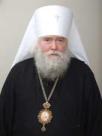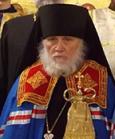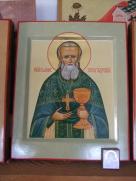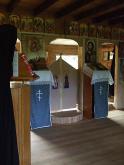Wednesday, July 16, 2014
Sts Peter and Paul
Of all the apostles the Church especially lauds Saints Peter and Paul, calling them glorious and all-praised leaders of the apostles. One of the four yearly fasts is also called by the name of one of these apostles and ends on their feast day.
Such great honor is proffered them for their great spiritual labors in the field of preaching the Gospel. Even such a prominent Church Father as St. John Chrysostom hesitates in giving preference to one or the other of them, frequently calling them pillars of the Church. The entire book of the Acts of the Apostles chiefly describes the work of the Apostles Peter and Paul in spreading the Gospel. It is interesting to note that Peter and Paul came from totally opposite wakes of life: Apostle Peter was poor and uneducated, while Apostle Paul came from a wealthy family and had a first-rate education for those times. The grace of God that illuminated both apostles shone forth equally from both of them, which leads one to think that our earthly provenance has no significance in the face of eternity. The words of our Lord Jesus Christ come to mind, that “God is able out of these stones to raise up children unto Abraham” (Luke 3:8).
The holy Apostle Peter, a native of the city of Bethsaida and older brother of the first-called Apostle Andrew, was a man of ardent and impulsive nature, illiterate, a simple and God-fearing fisherman. At the Lord’s first summons he left his fishing nets and followed Christ. The Lord always distinguished Peter for his loyalty: he was a witness to Christ’s Divine glory during the Transfiguration on Mount Tabor, he also witnessed the resurrection of the daughter of Jairus, by God’s will he walked on the waters of the lake of Gennesaret. St. Peter earned the Lord’s favor by being the first, on behalf of the apostles, to confess Jesus Christ as the Son of God. However, Peter’s strong confession of the Lord as the Son of God did not subsequently prevent him from thrice renouncing his Teacher in the night of Judas’ betrayal. But this apostasy of Peter’s was expiated by his sincere repentance, and the Lord reinstated him in his apostolic dignity, as described by the Holy Evangelist John (21:15-17).
By the way, this place in the Gospel where the Lord reinstates Peter in his apostolic dignity, from which he fell through his renunciation, is wrongly interpreted by the Roman-Catholic Church as referring to the supremacy of Peter and the Roman bishops, i.e. the primacy of Roman popes.
After his reinstatement Peter remained steadfast in faith, and on the day of the Pentecost preached an inspired sermon that resulted in the conversion of several thousand people to Christ. His sermons were often accompanied by miracles, which made his words irrefutably convincing. Even the shadow of Apostle Peter miraculously healed the sick (Acts 5:15). Among the other apostles Peter enjoyed the primacy of honor, but not power. All decisions regarding the affairs of the Church he offered for examination to the council of the apostles, which sent him out on a par with other apostles to preach the Gospel, while Apostle Paul even contradicted him on several issues (Gal. 2:11).
Peter made six journeys throughout Asia Minor and wrote two epistles for fortifying the faithful, which are used in church services to this day. After the Dormition of the Holy Mother of God, Peter made his last journey from Jerusalem, traveling through Egypt, Britain, Greece, and arriving in Rome in A.D. 67. Here he converted to Christianity two favorite wives of Emperor Nero, who condemned St. Peter to crucifixion for this and for generally preaching Christianity in Rome.
The holy Apostle Paul (Saul), a native of the city of Tarsus, was a Jew from the tribe of Benjamin, and a Roman citizen by the merits of his ancestors, which was a rare combination at that time. He received a brilliant education in the school of the famous Jewish teacher Gamaliel and was educated as a Pharisee. The ardor of Saul (as he was called before conversion to Christianity) for Jewish law was so great that he hated Christians and persecuted them in all possible ways. He tormented the Church of Christ and was a great persecutor of Christians. But then the grace of God touched even him: on the road to Damascus, where he was traveling to engage in greater tormenting of Christians, the Lord appeared to him and summoned him to serve the Church. And thus from Saul, the persecutor of Christians, in a single moment he turned into Paul, one of the most fervent apostles of Christ. He traveled more than all the others to preach the Gospel. Three times he circled almost the entire Roman Empire. He wrote the greatest number of epistles – 14. He took part in the apostolic council. The holy apostle’s life was spent in constant travels through Asia Minor, Greece, and other parts of the Roman Empire, ending with the city of Rome, where he ended his life in A.D. 67 in the reign of Emperor Nero, being beheaded since he was a Roman citizen. His 14 epistles are comprised in the New Testament (as are the two epistles of Apostle Peter) and are used in church services year-round.
How much faith, love for God and their fellow-men, and loyalty to God’s will lived in the souls of the holy Apostles Peter and Paul! They spread the glad tidings into all the corners of the world, baptizing all peoples, suffering heat and cold, thirst and hunger, persecution and torture, – just to serve the great effort of the salvation of mankind! The entire universe of those days was filled with their preaching. Truly the prophetic words of King David came to pass: “Their line is gone out through all the earth, and their words to the end of the world” (Psalms 19:4).
Protopriest Igor Hrebinka (Bishop Joseph)





